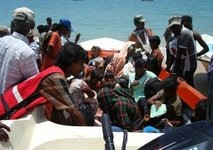 Britain and France’s foreign ministers arrived in Sri Lanka Wednesday to try and halt a blistering government offensive against Tamil Tiger rebels that has killed thousands of civilians.
Britain and France’s foreign ministers arrived in Sri Lanka Wednesday to try and halt a blistering government offensive against Tamil Tiger rebels that has killed thousands of civilians.
But David Miliband and Bernard Kouchner are expected to get a frosty reception from the island’s hawkish leadership, which says it is on the cusp of victory and has so far brushed off global alarm over the humanitarian crisis.
On the eve of the visit, Sri Lankan authorities announced they had denied Sweden’s Foreign Minister Carl Bildt a visa to join the peace mission — prompting a major diplomatic row with the European Union.
A Sri Lankan foreign ministry official indicated that Colombo felt it had already done enough by letting in Miliband and Kouchner, who also want to see the government lift a ban on foreign aid staff working in the war-torn north.
"The Swedish minister also wanted to jump on that bandwagon and we said no," the official said. "Some think they can land up at our airport and expect a red carpet treatment. We are not a colony."
Bildt described the snub as "exceedingly strange behaviour" and said he had recalled the Swedish ambassador to Colombo.
Czech Foreign Minister Karel Schwarzenberg, whose country holds the EU’s rotating presidency, said Sri Lanka’s government had made a "grave mistake."
The row is a symptom of Sri Lanka’s growing antipathy towards the West, with officials here regularly accusing the United Nations and aid groups of supporting or colluding with the Liberation Tigers of Tamil Eelam (LTTE).
After months of heavy fighting, the Tamil Tigers have now been confined to a tiny strip of coastal jungle in the northeast and are said by the military to be down to their last few hundred fighters.
With Colombo sensing victory after three decades of battling the guerrillas and numerous failed peace efforts, a European diplomat said Miliband and Kouchner’s appeals for a truce would likely fall on deaf ears.
"There certainly won’t be a very good atmosphere in their meetings," the Colombo-based diplomat told AFP.
According to the French foreign ministry, the two will also urge "respect for international humanitarian law and protection of civilians" — although here too the Sri Lankan government says it has done nothing wrong.
At the centre of international concern are tens of thousands of Tamil civilians caught up in the fighting.
A UN document circulated among diplomats in Colombo last week said as many as 6,500 civilians may have been killed and another 14,000 wounded in the government’s offensive so far this year.
The island’s government has for months blocked most aid agencies from working in the war-torn north, and has herded escaping civilians into overcrowded camps which are guarded by the military.
Aid workers who have visited the camps have testified to food shortages, woeful sanitation, a desperate medical situation and chronic overcrowding.
The UN also estimates that a further 50,000 non-combatants are still trapped in the conflict area.
Although the LTTE has been widely condemned for holding the civilians as human shields, the UN’s rights chief has said both sides in the long-running ethnic war may be guilty of war crimes.
Earlier this week the UN’s humanitarian chief, John Holmes, left the island empty handed after he tried to secure greater humanitarian access.
(For updates you can share with your friends, follow TNN on Facebook and Twitter )
